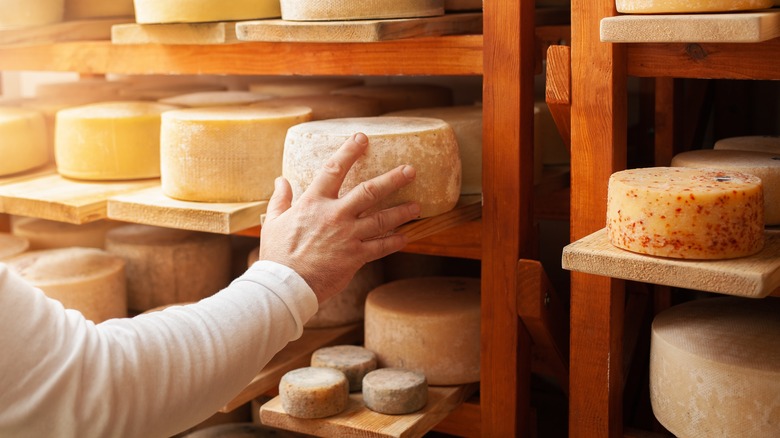What Happens To Your Poop When You Eat Cheese Every Day
It's hard to escape cheese. Not only does it magically transform any dish into gooey goodness, but most people also can't resist its umami taste. In fact, science actually thinks that cheese speaks to all sensory points in your mouth.
If you're wondering what happens to your body when you eat cheese every day, you get a lot of protein, fat, and calcium in your diet, for starters. Cheese also contains other beneficial vitamins and minerals like vitamins A and B12, zinc, and phosphorus, per Healthline. Your teeth might remain free of cavities, your bones, muscles, and nerve function might improve, and you may have less risk of cardiovascular disease.
However, you may also start seeing signs of excessive cheese consumption in your poop (or lack thereof, so to speak). Constipation — having fewer than three bowel movements or straining to get things moving with your daily poop time — is often characteristic of eating too much cheese, per experts. According to Cleveland Clinic gastroenterologist Dr. Christine Lee, there are two reasons why this happens: The high binding property of calcium in cheese, along with the lack of fiber in this high-fat food (via Everyday Health).
Diarrhea is a possibility with cheese consumption too
Loose stools are also a concern when you consume cheese, especially if you're lactose intolerant. When undigested lactic acid sits in your digestive tract, it can lead to cramping, bloating, gas, diarrhea, and general gastrointestinal discomfort. Nausea and vomiting can be symptoms too.
Lactose intolerance is a lot more common than you think. In fact, about 65% of the world's population finds it difficult to tolerate dairy or dairy-based products. You could develop lactose intolerance as you age too, even if you weren't born with an inability to break down this milk sugar. Health conditions that affect your gastrointestinal tract, like inflammatory bowel disease or IBD (which includes Chron's disease and ulcerative colitis), celiac disease, and even injuries to your intestines, can cause lactose intolerance (via WebMD).
Now that you know what happens to your bowel movements with cheese consumption, should you be swearing off the stuff entirely? Not necessarily, according to experts.
How to consume cheese if you're having poop issues
If you have particular digestive conditions or any underlying health concerns where your healthcare provider has asked you to avoid cheese altogether, then it's best that you follow that advice.
Otherwise, there's no need to swear off cheese — at least, all kinds of cheese and all quantities — entirely. As explained by registered dietitian nutritionist Megan Hilbert (via Eating Well), you can try changing how much you consume and what kind of cheese you're eating and see what happens to your poop. "If you suspect cheese is the culprit of your symptoms (constipation), try small portions of hard cheeses like parmesan or cheddar first and see how you feel. After that, you can incorporate smaller amounts of softer cheeses like mozzarella or Brie, once you confirm hard cheeses don't contribute to symptoms." But if you're looking for other gut-friendly dairy options, probiotics like yogurt or kefir can help when you're constipated.
In the case of diarrhea and lactose intolerance, avoid cheeses abundant in lactose, like the soft, creamy kinds (think ricotta and cream cheese), and go for the harder ones like Swiss, parmesan, and cheddars (via WebMD). It might take some trial and error to figure out what works and what doesn't. If your poop habits are causing a lot of distress, stop eating dairy and see what happens. And if lifestyle changes like a high-fiber diet, exercise, and hydration aren't helping, you may want to see a doctor.



